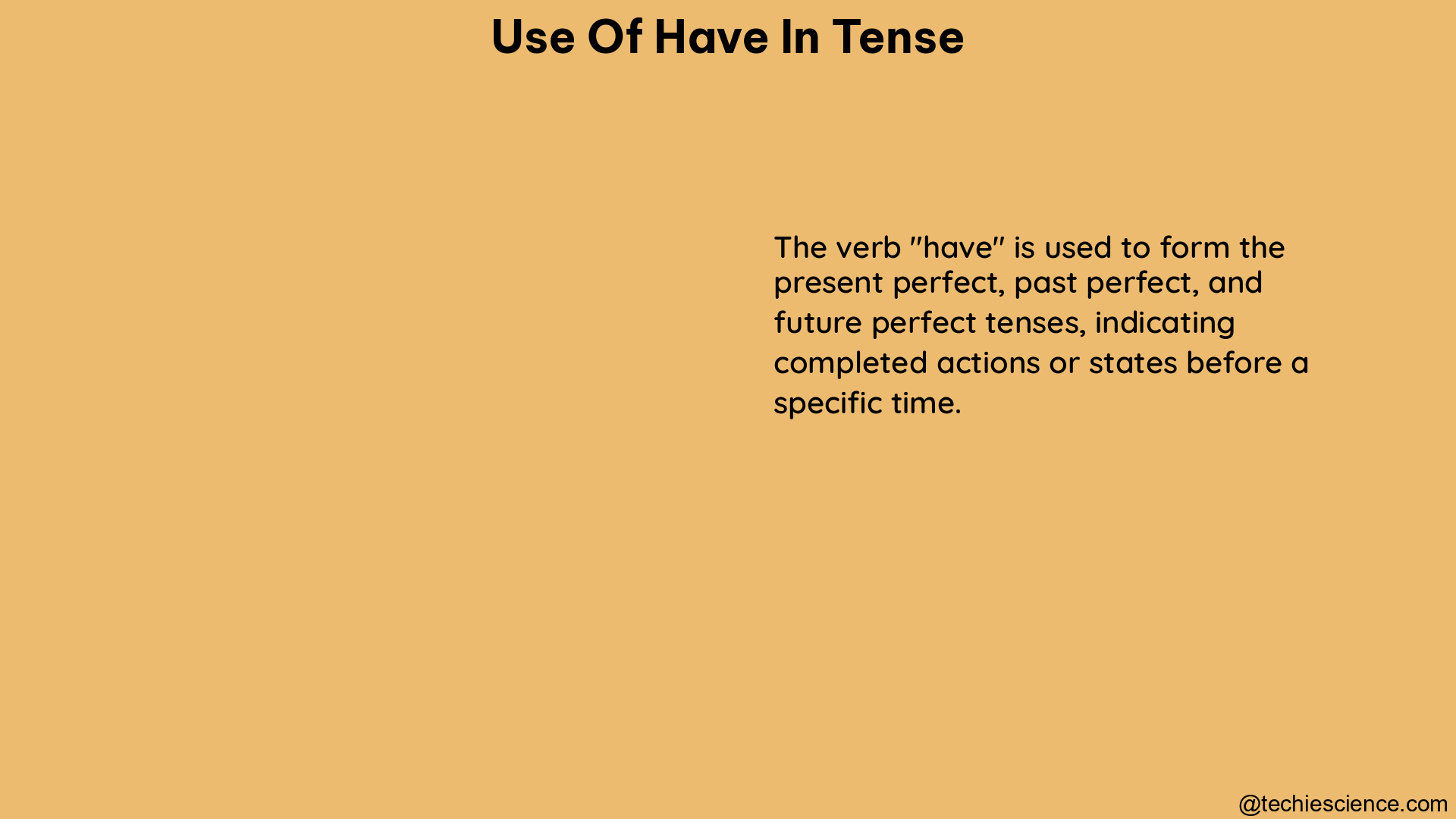The verb “have” is a versatile and essential element in English grammar, serving as both a main verb and an auxiliary verb. Its usage spans across various tenses, including the present, past, and future, and it plays a crucial role in expressing possession, relationships, actions, and activities. In this comprehensive guide, we will delve into the intricate details of using “have” in different tenses, providing you with a thorough understanding of its grammatical applications.
Main Verb Uses of “Have”
Possession and Relationships
- Present Tense:
- “I have a car.”
- “She has nice hair.”
-
“They have children.”
-
Past Tense:
- “I had a car.”
- “She had nice hair.”
-
“They had children.”
-
Present Participle:
- “I am having a shower.”
- “She is having a meeting.”
- “They are having a party.”
Actions and Activities
- Present Tense:
- “I have a shower every day.”
- “She has a lot of meetings.”
-
“They have dinner at 7 o’clock.”
-
Past Tense:
- “I had a shower yesterday.”
- “She had a meeting last week.”
-
“They had dinner at 7 o’clock last night.”
-
Present Participle:
- “I am having a shower now.”
- “She is having a meeting today.”
- “They are having dinner tonight.”
Auxiliary Verb Uses of “Have”

Present Perfect Tense
- Affirmative Sentences:
- “I have done my homework.”
- “She has finished her project.”
-
“They have completed their tasks.”
-
Contractions:
- “I’ve done my homework.”
- “She’s finished her project.”
- “They’ve completed their tasks.”
Past Perfect Tense
- Affirmative Sentences:
- “I had done my homework.”
- “She had finished her project.”
-
“They had completed their tasks.”
-
Contractions:
- “I’d done my homework.”
- “She’d finished her project.”
- “They’d completed their tasks.”
Future Perfect Tense
- Affirmative Sentences:
- “I will have done my homework.”
- “She will have finished her project.”
-
“They will have completed their tasks.”
-
Contractions:
- “I’ll have done my homework.”
- “She’ll have finished her project.”
- “They’ll have completed their tasks.”
Conjugation and Contractions
Present Tense
- I have
- You have
- He/She/It has
- We have
- They have
Past Tense
- I had
- You had
- He/She/It had
- We had
- They had
Present Participle
- Having
Contractions
- I’ve (I have)
- You’ve (You have)
- He’s/She’s/It’s (He/She/It has)
- We’ve (We have)
- They’ve (They have)
Examples and Specific Uses
Present Perfect Tense
- “I have invited you all here for a reason.” (First person singular)
- “You have surmised by now.” (Second person singular)
- “She has played banjo for four years.” (Third person singular)
- “They have two dogs.” (Third person plural)
Past Perfect Tense
- “I had seen the film before.” (First person singular)
- “You had seen the film before.” (Second person singular)
- “She had seen the film before.” (Third person singular)
- “They had seen the film before.” (Third person plural)
Key Points to Remember
- “Have” is used with the pronouns “I,” “you,” “we,” and “they.”
- “Has” is used with the pronouns “he,” “she,” and “it.”
- “Had” is used for both the past tense and past participle.
- Contractions are commonly used in spoken English, especially with auxiliary verb forms.
References
- LanGeek. (n.d.). How to Use the Verb “Have” in the English Grammar. Retrieved from https://langeek.co/en/grammar/course/716/have
- Collins Dictionary. (n.d.). How do you use the verb ‘have’ in English? – Easy Learning Grammar. Retrieved from https://grammar.collinsdictionary.com/us/easy-learning/how-do-you-use-the-verb-have-in-english
- Thesaurus.com. (2020, September 11). “Have” vs. “Has”: When To Use Each One. Retrieved from https://www.thesaurus.com/e/grammar/has-vs-have/
Hey! I am Arpita Bose Roy. My qualifications are M.A. in English with B. Ed. in both general education and special education. I have 2 years of experience as a “language analyst” at IIT Kharagpur and 4 years of experience as an “Academic Content Developer” at IIT Kharagpur. Currently, I am working as an academic writer at Lambdageeks.